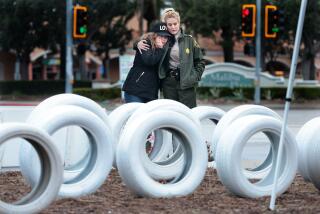New Traffic Laws to Make Life Busier for Police : Safety: The three most significant measures will affect riders in pickup trucks, children on bicycles without helmets and young people who drink and drive.
ANAHEIM — About 200 new traffic laws take effect Jan. 1, but only those involving pickup truck passengers, motorists under 21 who drink and drive, and children who ride bicycles without helmets will have a large impact on Orange County law enforcement agencies, the California Highway Patrol said Monday.
CHP Sgt. Robert (Skip) Carter told about 100 police officers and traffic court officials during a seminar at Anaheim City Hall that “only three of these laws will have an effect on what you do out there on the streets. . . . The rest have very little to do with what everyone out there deals with.”
The major changes make it illegal to ride in the back of a pickup unless strapped in by a lap belt attached to a seat bolted into the bed or unless the bed is covered by a camper shell; require the Department of Motor Vehicles to suspend for one year the license of drivers under 21 with minimal traces of alcohol in their systems, and require anyone 17 or under to wear a helmet when riding a bicycle.
Carter said the CHP supports all three of the laws, although the agency feels each has loopholes.
“Hopefully, we’ll get them worked out in the next year,” Carter said.
The pickup truck law was prompted by several high-profile accidents, including one last spring that killed seven teen-agers when their truck flew off the Long Beach Freeway. Eighty-six pickup truck riders have been killed and 3,600 injured in the last two years, the CHP said. Current law allows people over age 12 to ride in the back of trucks as long as one of the riders is 18 or older.
But Carter said the CHP was opposed to an exemption in the new law given to trucks carrying farm workers to or from the field.
“I guess some lives are not as valuable as others,” he said.
Also, he said, exempting pickup trucks with camper shells provides a false sense of security for riders, when in reality they are no safer than riders in an uncovered truck.
“The only thing (shells) do is help us locate the bodies,” Carter said. “We don’t have to go looking for them.”
The underage drinking law calls for the automatic suspension of the driver’s license of any 16- or 17-year-old who has a blood-alcohol content of .01% or higher and those of 18-, 19- and 20-year-old drivers who have a blood-alcohol content of .05% or higher.
“It’s illegal for anyone under 21 to possess, consume or purchase alcohol, so this closes one loophole,” Carter said.
But it leaves open another, he said, because the drivers will not be charged with drunken driving unless they have a blood-alcohol content of .05% or higher if they are under 18 or at least .08% if they are 18 to 20. The legal limit for adults is .08%.
This means, for example, that a 17-year-old with a .02% blood-alcohol content will have his name taken to be forwarded to the DMV for license suspension, but will not be subject to arrest. He might have to be allowed to drive away, Carter said.
“The intent of the law is good, but it needs to go further,” Carter said.
The bike law requires children under 18 to wear a helmet. In 1994, violators will receive a warning. In 1995, they will receive a $25 ticket.
But the law has enforcement problems, Carter said.
“What happens if you stop a child who doesn’t have” identification, Carter said. “Do you just take their word when writing the ticket? And what happens if they refuse to sign the ticket? Do you haul them off to jail?”
More to Read
Sign up for Essential California
The most important California stories and recommendations in your inbox every morning.
You may occasionally receive promotional content from the Los Angeles Times.










